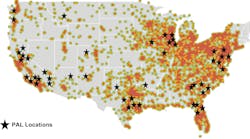It's been a rough 18 months, combining rising fuel costs, shrinking freight levels, a major upheaval in equipment purchasing plans and sobering increases in insurance premiums with an overall bleak economic landscape. While its bankruptcy captured headlines because of its size, Consolidate Freightways was only one of many fleets that sank under the weight of those conditions.
Maybe it's just survivors' euphoria, but many fleet executives seem positively upbeat about the coming year. Judging by third-quarter results for fleets that have survived, they have good reason to project better times ahead. Many reported healthy revenue growth compared to the previous year, and more importantly, many also managed to actually improve profit margins on those growing revenues.
While the bad times have been painful, it turns out the cloud does indeed have a silver lining — freight capacity has finally tightened. And for those healthy enough and nimble enough to respond to the changing freight market, it's time to recover some of what was lost to shippers when the market initially softened.
As the head of one major truckload carrier put it, “Our customers weren't shy about rates when the market was soft. Now we're taking the initiative to get paid for what we do and recover what we lost in more competitive times.”
Don't break out the champagne just yet. The revenue and profit gains were modest and to a large extent fueled by CF freight that was suddenly dumped back into the market. And overall economic news remains contradictory with positive and negative indicators being reported in the same breath by the general business press. Preparations for a war that may or may not happen also serve as a reminder that these are still unsettled waters we're navigating.
However, the stars are aligned for real growth among for-hire carriers next year if the economy continues to strengthen. The cost of new equipment, capital and fuel remain high enough to present a fairly high barrier of entry to new competitors as freight levels rise, meaning those carriers who've spent the last two years getting their houses in order should be well positioned to start placing a more realistic value on the transportation services they provide. After a decade of struggling to get decent rates, the industry may finally be entering a sustained period of both top- and bottom-line growth.
Such rate relief is also good news for private fleets, since it will help them gain internal recognition for the true value of their contributions, not to mention reduce pressure from third-parties looking to provide outsourced trucking services. And, of course, the industry's suppliers, from truck manufacturers to even minor component makers, can only benefit from a healthy carrier environment.
It's entirely possible such optimism is premature, but I think the fundamentals for trucking's recovery are all in place now, and whether it takes one month or six, you're going to reap the rewards of sticking to business when the times got tough.
E-mail: [email protected]
Web site: fleetowner.com


